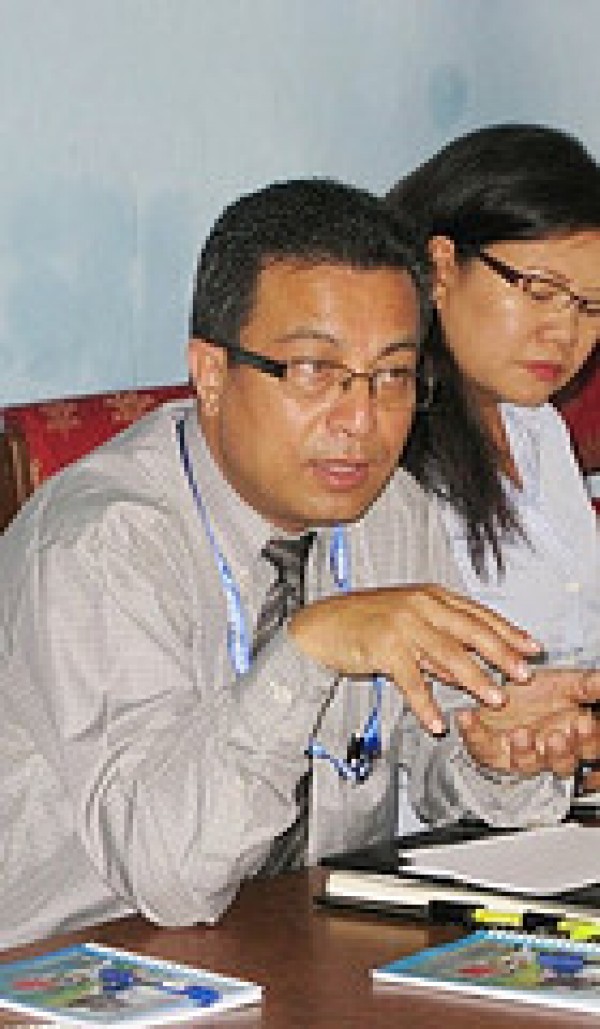Workshop on Cities and Climate Change Initiatives to Municipalities

The Ministry of Local Development and UN-HABITAT jointly organized a workshop on Cities and Climate Change Initiatives to officials of municipalities in Kathmandu on 19 October 2011. Chief Executive Officers, Chiefs of Environment Department and other officials of the five municipalities of Kathmandu valley had participated in the workshop. Mr. Padma Sunder Joshi, Habitat Programme Manager highlighted the importance of knowledge on impacts of the climate change in the cities. He urged urban planners and the local government officials should understand the two parallel phenomena, urbanization and climate change particularly in the context of cities. He further shared the UN-HABITAT initiatives ‗cities and climate change initiative‘ to understand and address the linkage between climate change and urban development in major cities of the globe. He urged the study on 'Vulnerable Assessment and Adaptation Planning in Kathmandu' as "cities and climate change initiatives" programme of UN Habitat, will assist to identify the issues and context of the hilly cities. Ms. Lowie Rosales, Regional Representative, UN HABITAT Regional Office, said urbanization and climate change are two major human created elements that have negative and dangerous impacts upon quality of life and economic condition of the people and their social stability. She further added that climate change effects such as extreme weather events, damage to urban infrastructure, problems of waterborne disease, food security, and climate refugees are higher in rapidly urbanizing cities. Ms. Lowie Rosales explained on the 'cities and climate change initiatives' programme of UN Habitat to respond climate change issues to contributes to reduce green house gas emission and city level vulnerability. She suggested to minimize the gap between national and local government level climate change adaptations as well as mitigation policy and actions. She urged to enhance and scale up the skill as and capacity of local government authorities on climate change and urban infrastructure development. Mr. Binod Prakash Shinh, Under Secretary at Ministry of Local Development, told that the Nepal Government has initiated the national level programmes to address the challenges of impacts of climate change and urbanization. He stressed on implementation of the local government led action oriented programmes to mitigate the climate change impacts and urbanization. He added the government should initiate to strengthen the local authority institutions through the policy as well as the programmes to mitigate the climate change impact and challenges in the cities. Mr. Bhushan Tuladhar, Chief Technical Advisor at UN Habitat Water for Asian Cities, South Asia Region, briefed on the phenomenon and evolution effort on climate change. He informed that the cities occupied 2 percent of the area in the globe and responsible for up to 70 percent of greenhouse gas emission (GHGs). It should be focused to understand the linkages between climate change and urban development; and accelerate the activities which minimize the climate change impacts. He further told that more than 95 percent of the global population growth will be in urban area and 92 percent of these growths will be added in the developing countries. He further shared that Nepal's urbanization rate is 6.4 percent which is the highest in Asia region and Kathmandu valley occupied 31 percent of total urban population of the country. Mentioning that Nepal has been identified as on of the most vulnerable countries to the impacts of climate change with one of the highest rates of urbanization, he has stressed on risk of unprecedented negative impacts of climate change on the quality of life and economic and social stability due to the rapidly urbanizing in Kathmandu. He shared the Preliminary Findings of study on Vulnerability Assessment & Adaptation Planning in Kathmandu Valley jointly conducted by the government of Nepal and UN-HABITAT. He highlighted the findings of vulnerability assessment and adaptation plans for understanding and addressing the linkages between climate change and urban development in Kathmandu, especially the water and sanitation management and Settlements & infrastructure aspect in the Kathmandu valley. He further stressed on the local governments role and responsibility to implement the climate change mitigation and adaptation activities in the Kathmandu valley; which should be incorporate in the city development plans and activities.





